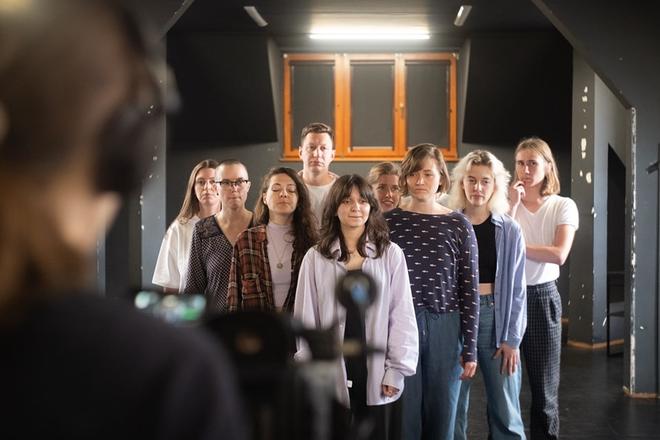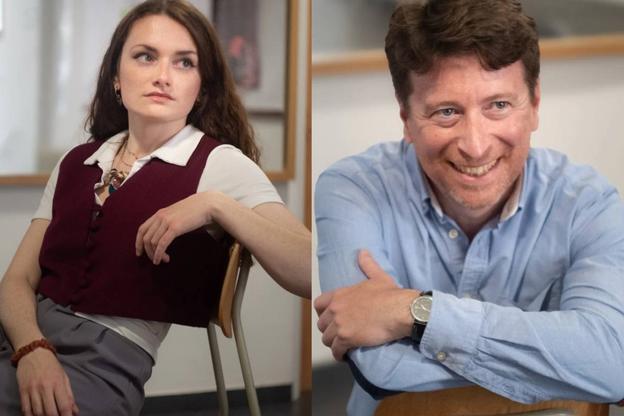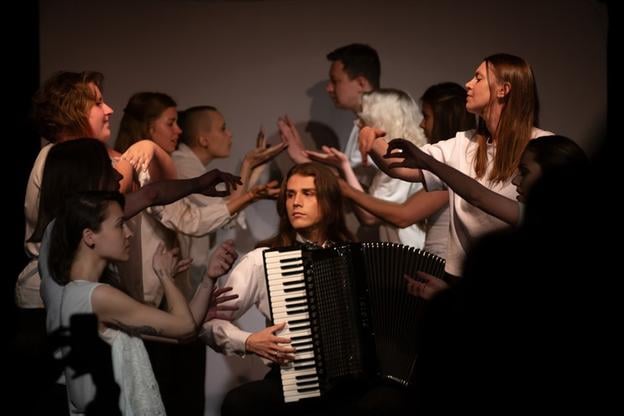Since its founding in 2019, THEATRA Bratislava has carved out a unique space in the capital’s cultural landscape. Led by French theatre professionals Guillaume De Canck and Aurélie Houser, the group uses theatre as a tool for personal development, education, and building social connections – often in unconventional ways.
Performances take place in parks, schools, and even on the streets, where the audience is invited not just to watch but to participate. “We want people to leave not with answers, but with questions,” says De Canck. “That’s why we sometimes bring the audience into the performance itself.”
Theatre as a learning space
One of THEATRA’s core areas is personal development. Through year-long acting classes, participants build confidence, improve public speaking, and explore creativity – culminating in a final performance.
“It’s a process,” De Canck explains. “The workshops grow into a full play by the end of the year.”
The organisation also works directly with schools, where theatre becomes a dynamic tool for educational enrichment. Students aged 11 and up explore languages, literature, and even science through movement and emotion, rather than rote memorisation.
“We want to activate the whole body and all emotions – not just the brain,” De Canck says.
Building social bonds through art
The third pillar of THEATRA’s mission is community connection. The company partners with NGOs, civic groups, and marginalised communities, offering theatre as a means of creative bonding – free of commercial transactions.
“We want people to come together through creation, not consumption,” says De Canck.
Multilingualism is always central in this. Performances often blend Slovak, Ukrainian, French, and English without subtitles.
“We don’t translate – we trust the audience to feel their way through,” he adds. “Language itself becomes part of the artistic and political message.”
Personal growth on stage
For Lena Rozkova, a Russian native who moved to Bratislava from Poland 13 years ago, THEATRA offered a return to her lifelong love of theatre. A PhD graduate in central European drama history, she discovered the group through Facebook and joined their adult acting classes.
“Reality exceeded all expectations,” she says. “We didn’t just prepare a complex performance – we explored stage techniques, tried improvisation, and found confidence on stage.”
Rozkova describes De Canck and Houser as “attentive and thoughtful mentors” who helped her grow personally as well as artistically.
Vladyslava Balera, a participant in THEATRA’s "From Lettrers to Stage" project, joined the project after seeing an open call from the Bridge language school in Bratislava. Originally from Balakliia, Ukraine, she now sees theatre as a form of healing and social commentary.
“Our performance was about finding home in Slovakia, coping with loss, and expressing trauma through art,” she says.
Letters, refugees, and understanding
Last June, THEATRA staged “From Letters to Stage” at Bratislava’s Divadlo Lab. Supported by the UN Refugee Agency and the French Embassy, the play brought together 12 participants – six Ukrainians and six Slovaks – in a multilingual piece based on letters written by Košice students to Ukrainian refugees.
With five performances in Bratislava and Košice so far, the production traces the refugee experience from departure to resettlement. “It shows the emotional journey: leaving home, arriving in a new country, the hopes, the struggles,” says De Canck. The performance featured live accordion music and was followed by a post-show discussion.
Balera says the play helped bridge growing gaps in understanding. “We spoke openly about difficult issues,” she says. “That helps Slovaks understand what many foreigners are going through.”
Revisiting the “! absurd(E) ?”
Later that week at Bratislava’s Teatro Colorato, Rozkova took the stage in “!absurd(E)?”, a bilingual French-English performance developed by THEATRA’s adult group. Inspired by post-WWII absurdist playwrights like Beckett and Ionesco, the performance also included original scenes reflecting modern-day absurdities.
“We wanted to show how absurdity still exists today – in politics, in how people interact with AI, and in our everyday chaos,” De Canck explains.
The 75-minute play combined humour and fragmentation to explore complex existential questions. Rozkova describes it as “challenging, philosophical, and deeply relevant”.
Theatre for everyone
Earlier this year, THEATRA Bratislava took part in the 2025 Wien Festival Creative Experience,a yearly event around the Wiener Festwochen. Their unique event mixes interactive workshop, attendance to performances of the Vienna festival and meetings with artists. The event reflected the group’s core belief: that theatre is a shared act, not a product.
“Our goal is to make theatre with people, not for people,” the group stated. By encouraging spontaneous play and creativity among strangers, they aimed to blur the line between performer and audience.
Whether performing in a Bratislava park or on a Viennese street, THEATRA stays grounded in its mission. As De Canck put it, “We are obsessed with inclusion, multilingualism, and questioning the role of the audience, and we want to use theatre in places where we usually do not do theatre.”


 Actors from “Letters to Stage” (source: UNHCR - Samo Šóth)
Actors from “Letters to Stage” (source: UNHCR - Samo Šóth)
 French theatre professionals Guillaume De Canck (r) and Aurélie Houser (l) (source: Theatra Bratislava)
French theatre professionals Guillaume De Canck (r) and Aurélie Houser (l) (source: Theatra Bratislava)
 A scene from “From Letters to Stage” (source: Theatra Bratislava)
A scene from “From Letters to Stage” (source: Theatra Bratislava)